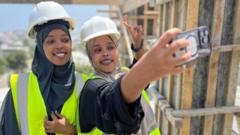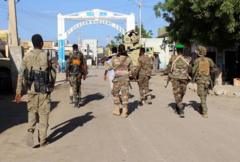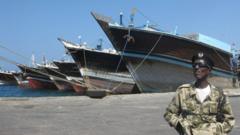In the vibrant landscape of Mogadishu, Somalia's capital, the ongoing construction boom is not just transforming the skyline but also empowering women like Fathi Mohamed Abdi and Saadia Ahmed Omar, who are at the forefront of this change. The two young engineers, both just 24, have been instrumental in spearheading a 10-floor apartment complex in the Hodan District, showcasing their expertise amid a male-dominated industry.
"When I started, people doubted me," says Ms. Abdi, chief operating officer of Arkan Engineering Services. According to her, skepticism arose about women handling constructions and finances. Nonetheless, she and Ms. Omar are paving the way for female representation in engineering—a field where only about 5% of practitioners are women. "Mogadishu needs us," Ms. Omar asserts, emphasizing their commitment to rebuilding their city, born amidst the chaos of civil war that erupted in the early 1990s.
The palpable changes in Mogadishu's landscape—a burgeoning skyline filled with cranes and construction sites—reflect the potential for recovery and modernization. Over the past five years, more than 6,000 buildings have been erected in the city, a sign of escalating urban development fueled by improved security and remittances from the Somali diaspora, which are pivotal to the economy.
However, as the city evolves, many architects and engineers express concern over rapid developments that risk overshadowing Mogadishu’s rich architectural heritage, with some fearing the loss of the city’s historical character. Veteran architect Siidow Cabdulle Boolaay warns that new constructions lack regulatory oversight and may compromise structural integrity, while issues surrounding safety and environmental sustainability remain unresolved.
Despite these obstacles, Ms. Abdi and Ms. Omar have defied the norms, each successfully managing multiple multimillion-dollar projects and overcoming initial rejections in their careers due to gender biases. Their determination exemplifies the gradual shift in societal perceptions surrounding women in construction. The Mogadishu Engineer Association actively promotes women's participation in the workforce, recognizing their critical role in filling professional gaps.
As they continue their work, both engineering graduates from Plasma University emphasize the need for a coordinated approach to tackle infrastructure challenges facing the city, particularly concerning water management in light of rapid urbanization. With significant progress still needed, initiatives toward modern urban planning are underway, with hopes of achieving a comprehensive sewage system and imposing new building regulations.
Despite ongoing threats from extremist groups, the resilient ambitions of Somalia’s engineering community reflect a shared vision: a modern Mogadishu as a beacon of hope for post-conflict recovery. "When I walk through the streets and see buildings I helped construct, I feel proud," reflects Ms. Omar. Similarly, Ms. Abdi believes they are not just constructing buildings but fostering a new chapter of empowerment, demonstrating that women can lead in shaping the city’s future.





















